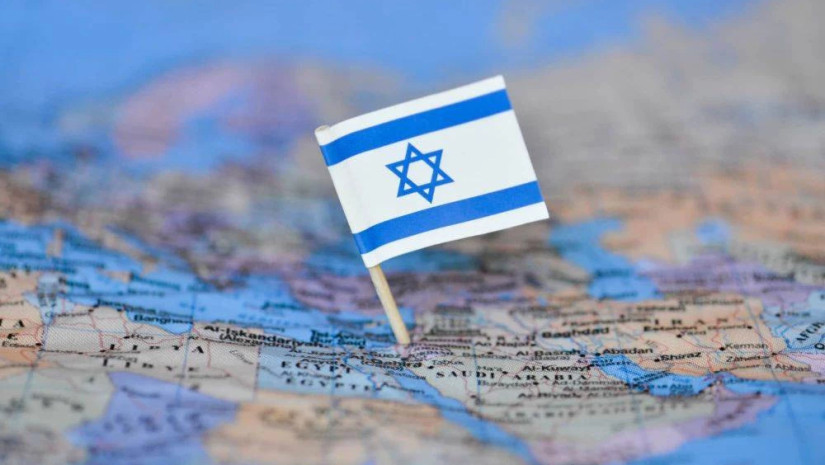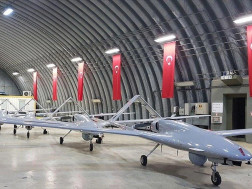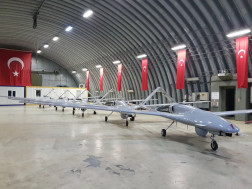Israel’s defense exports reached a new peak in 2022, with new contracts worth $12.5 billion (NIS 45.5 billion), Minister of Defense director general Eyal Zamir, and the head of the ministry’s International Defense Cooperation Directorate, Yair Kulas, announced. The figure keeps Israel in the top ten countries for defense exports. Between 75% and 80% of Israel’s defense production is for export.
Israel’s defense exports climbed 30% from $8.55 billion in 2020 to $11.3 billion in 2021, and by a further 10% in 2022.
UAV and drone systems accounted for 25% of the value of defense export contracts. Government to government deals between were ten times their level in 2018, at $4 billion. Half the contracts in 2022 were worth over $100 million. Exports to Abraham Accords countries amounted to $3 billion, accounting for 24% of total defense exports, up from 7% in 2021.
In the geographical breakdown, the Asia-Pacific region accounted for 30% of the total, and Europe 29%. In 2021, Europe’s share was 41% and Asia-Pacific 34%.
After UAVs and drones, the breakdown by category in 2022 was missiles, rockets and air defense systems - 19%; radar and electronic warfare systems - 13%; manned aircraft and avionics - 5%; observation and optronics equipment - 10%; firing and launching systems - 5%; vehicles (including armored vehicles) - 5%; communications systems - 6%; intelligence and cyber systems - 6%; ammunition - 4%; marine systems - 1%; customer service and miscellaneous - 1%.
Minister of Defense Yoav Gallant said, "The unprecedented figures that the defense establishment has presented, headed by a new record in the value of defense exports, illustrate in the most prominent way the State of Israel’s security strength and technological superiority. Thanks to the creativity and innovativeness of the people in the defense industries and the Ministry of Defense, we succeed in keeping ahead of our enemies and maintaining our qualitative advantage over them. The citizens of Israel have great cause for pride, both in the exceptional numbers, and, even more so, in those behind them.
"Global changes have led to great demand for Israeli technologies, which have acquired a high reputation around the world, and we expect this trend to continue and strengthen in the coming year."
"Our defense exports make a vital contribution to the security of the country, to its economic growth and to national strength," Zamir said. He pointed out that close to 100,000 households in Israel earn a living, directly or indirectly, from the defense industry, a large proportion of them in the periphery of the country.
Elbit wins another contract in Germany
Meanwhile, with the German parliament expected to approve an advance payment of €560 million on a €4 billion deal to buy Israel’s Arrow 3 missile defense system, another deal has been signed with Berlin. Elbit Systems announced that it had been awarded an additional contract by Airbus Helicopters for the Federal Office for Bundeswehr Equipment, Information Technology and In-Service Support, for the provision of Airborne Electronic Warfare (EW) self-protection systems for the CH 53 GS/GE transport helicopters, as part of the platform upgrade program led by Airbus Helicopters.
Elbit Systems, supported by Elbit Systems Deutschland, will provide digital Radar Warning Receivers (RWR), EW Controllers (EWC) and Counter Measure Dispensing Systems (CMDS). The company says that digital RWR and EWC rapidly detect and accurately locate a wide range of threats, even in a dense EW environment, enabling reliable and timely warning and effective protection.
Oren Sabag, General Manager, Elbit Systems ISTAR and EW said, "We are proud to cooperate with Airbus Helicopters and appreciate the trust that the German Air Force places in our leading technologies that will continue to provide enhanced survivability and to increase mission effectiveness."
This deal, like many others concluded by Israeli defense companies in Europe recently, shows the influence of the war in Ukraine, which has led to higher defense procurement budgets all over the continent. Israel’s defense products have acquired a good name around the world, for example from the Second Nagorno-Karabakh War in 2020, in which Azerbaijan forces routed those of Armenia partly thanks to the use of Israeli-supplied drones and other weaponry, and so the volume of arms deals has steadily grown, Globes reports.
















